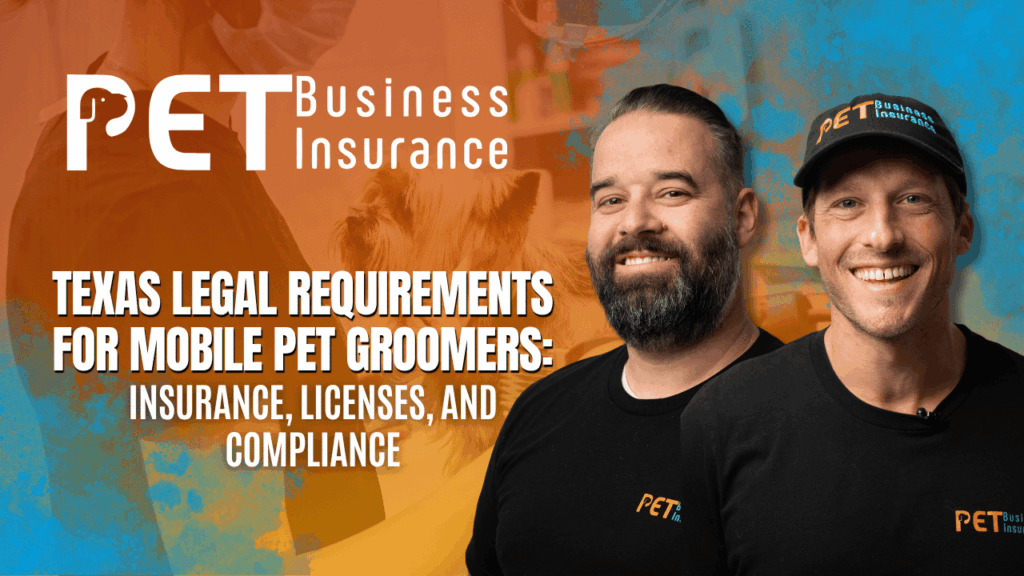
Are you thinking about starting a mobile pet grooming business in Texas?
Wondering how to stay legally compliant while avoiding costly fines, lawsuits, or shutdowns?
In this guide, you’ll learn exactly what licenses, permits, insurance policies, and compliance standards are required to legally operate a mobile pet grooming business in the Lone Star State.
We’ll cover:
- Texas’s unique approach to pet grooming regulation
- Statewide and local licensing and permitting requirements
- Essential insurance coverage types and why they matter
- Vehicle, equipment, and operational compliance standards
- A step-by-step checklist to help you stay legally covered
Texas Has No State License for Pet Groomers—But That Doesn’t Mean You’re Off the Hook
Texas does not require a state-issued license to become a pet groomer.
That’s both a blessing and a curse. While it lowers the barrier to entry, it also places the full burden of legal compliance on business owners—especially mobile ones.
Local regulations, municipal permits, and insurance expectations still apply. In fact, ignoring these can lead to serious financial consequences, as in the case of Maria Rodriguez, a Houston-based mobile groomer who incurred over $17,000 in fines and legal fees within six months of launching.
Key Takeaway: Even though Texas doesn’t mandate state-level certification, mobile groomers must still navigate city-by-city requirements and protect themselves with proper insurance.
TDLR Doesn’t Regulate Grooming—But It Offers a Glimpse Into the Future
The Texas Department of Licensing and Regulation (TDLR) does not regulate pet grooming, but it does oversee mobile barbers and cosmetologists. These industries face:
- GPS reporting requirements
- Self-contained equipment and utility systems
- Regular inspections
Mobile groomers would be wise to voluntarily adopt similar standards to:
- Preempt future regulation
- Show professionalism
- Build client trust
Business Structure, Registration, and Federal Compliance
Whether you’re operating solo or building a team, you must:
- Register your business with the Texas Secretary of State
- Choose a structure (LLC recommended for liability protection)
- File for an EIN with the IRS
- Comply with the Corporate Transparency Act, which requires disclosing business owners to FinCEN
Neglecting these steps can block access to banking, invalidate contracts, or trigger federal fines.
Local Licensing and Compliance Is Where Things Get Tricky
Here’s how three major Texas cities differ:
Houston
- Requires a Commercial Pet Service Facility License
- Regulates water supply, pest control, waste disposal, and equipment sanitation—even for mobile units
Austin
- Requires a Mobile Retail Establishment Permit
- Emphasizes zoning compliance—some neighborhoods restrict mobile grooming activities
San Antonio
- Prioritizes vaccination documentation and allows businesses to require proof before service
- Applies overlay zoning restrictions in some neighborhoods
Pro Tip: Create a compliance matrix for every city you plan to operate in.
Insurance Isn’t Optional—It’s Your Lifeline
You’ll need more than just general liability coverage. Here are the essential policies:
- General Liability – Covers injuries to clients and damage to property
- Professional Liability (E&O) – Covers service-related claims (e.g., a bad haircut or injured pet)
- Animal Bailee – Covers veterinary costs or pet death while in your care
- Commercial Auto – Required for any vehicle used for business
- Workers’ Compensation – Optional in Texas but strongly recommended
- Business Property/Equipment Insurance – Protects tools, tanks, and grooming hardware
Bonus Tip: Bundle policies where possible. It can cut premium costs by 10–25%.
Waste Disposal & Environmental Compliance Can Cost You Thousands
You’re responsible for proper handling of:
- Wastewater (can’t be dumped into storm drains)
- Animal hair and clippings
- Chemical waste from cleaning products
Cities and the Texas Commission on Environmental Quality (TCEQ) can impose hefty penalties for improper disposal. Use closed-loop water systems or licensed disposal services to stay compliant.
Your Vehicle Must Be Self-Contained, Safe, and Street-Legal
The mobile unit must include:
- Hot and cold water systems
- Climate control
- Electrical setups (installed by licensed electricians)
- Non-porous, easy-to-clean surfaces
- Animal restraints, fire extinguishers, and first aid kits
Additionally:
- You may need a commercial driver’s license (CDL) for larger vehicles
- Texas requires annual safety inspections and emissions testing in certain counties
Step-by-Step Compliance Checklist
Week 1: Assessment and Planning
- Review all local, state, and federal requirements
- List jurisdictions and their permit needs
- Identify compliance gaps
Week 2: Legal & Insurance Setup
- Register your business structure
- Purchase the 5 essential insurance types
- Apply for necessary city permits
Week 3: Operational Readiness
- Install vehicle safety and water systems
- Finalize employee training manuals
- Create SOPs for sanitation, client screening, and documentation
Common Mistakes That Can Sink Your Business
- Using personal auto insurance instead of commercial
- Skipping animal bailee coverage
- Ignoring zoning rules
- Assuming compliance in one city means you’re good everywhere
- Underestimating waste disposal responsibilities
What’s Coming Next? Future-Proof Your Business
Texas may eventually:
- Implement state-level licenses
- Introduce environmental recycling mandates
- Require digital service tracking for mobile units
Prepare now by:
- Adopting best practices from other regulated mobile industries
- Voluntarily pursuing grooming certifications (like AKC’s S.A.F.E. Program)
- Digitizing your records and GPS logs
Your Path Forward
At the end of the day, the biggest risk mobile pet groomers face isn’t a bad haircut—it’s legal noncompliance. This is especially true in Texas, where regulation varies city by city and insurance gaps can bankrupt a small business.
Now that you’ve learned the legal and insurance fundamentals from this guide, it’s time to audit your business setup, insurance coverage, and city-specific requirements before your next client appointment.
Your next step:
Review your insurance policies and verify your local licenses. If you’re expanding into a new area, treat each city as a brand-new compliance checklist.
Stay proactive. Stay protected. Stay in business.

